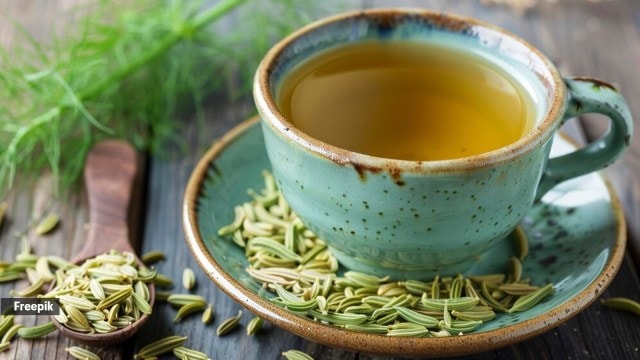📣 For more lifestyle news, click here to join our WhatsApp Channel and also follow us on Instagram
‘Make in under 7 minutes’: Wellness expert recommends this three-ingredient tea for bloating and gut health; we find out if it really works
Commonly consumed after meals, this tea is said to not only soothe digestive discomfort but also offer anti-inflammatory and detoxifying properties
 What is CCF tea? (Source: Freepik)
What is CCF tea? (Source: Freepik)Wellness expert Luke Coutinho recently shared a quick, natural solution for those with bloating, indigestion, or inflammation. He recommends a simple herbal blend known as CCF tea — made from cumin, coriander, and fennel seeds — as a gentle daily tonic to support gut health and metabolism. “Make in less than 7 minutes,” Luke wrote, encouraging people to brew the tea by boiling all three seeds in equal parts with two cups of hot water.
He highlighted the benefits, “Each seed contributes unique bioactive compounds, such as polyphenols, essential oils and antioxidants, which underpin the tea’s potential therapeutic effects.” Commonly consumed after meals, CCF tea is said to not only soothe digestive discomfort but also offer anti-inflammatory and detoxifying properties. Indianexpress.com spoke to an expert to understand its potential benefits further.
Does CCF tea actually help digestion and reduce inflammation?
Deepika Sharma, a personal trainer focusing on functional nutrition and ancient Indian wellness, tells indianexpress.com, “Yes, CCF tea can help digestion and reduce inflammation, but with certain complexities.”
“Cumin helps stimulate pancreatic enzymes, which improves digestion, with some anti-inflammatory and carminative properties. Coriander is a mild diuretic (makes one pee in simple terms), which is good for bloating and may help reduce gut inflammation via linalool, a compound shown to soothe the digestive tract,” she informs.
View this post on Instagram
Sharma continues, “Fennel is a classic gas-buster. It is rich in anethole, which has mild antispasmodic and anti-inflammatory effects. Together, they form a gentle gut-supporting infusion, especially post-meal.” Not a miracle cure, but they can reduce mild indigestion, bloating, and promote smoother digestion — particularly in Ayurvedic or low-agni (low digestive fire) contexts.
How potent are polyphenols, essential oils, and antioxidants in brewed tea vs. eating seeds?
Brewing draws out water-soluble compounds, Sharma says, but most essential oils and antioxidants (like polyphenols) are lipophilic (fat-soluble) which means you’ll get only a fraction of what the whole seeds offer.
“Chewing or grinding the seeds or cooking them in ghee/oil (like in tadka) gives far better extraction. That said, in a daily ritual context, even mild infusions can create cumulative benefits — especially through: routine hydration, parasympathetic activation and gentle flushing of toxins,” she suggests.
Risks with daily CCF tea consumption
Sharma says there are risks, especially for certain groups:
People with GERD/reflux: Fennel can relax the LES (lower esophageal sphincter), worsening reflux.
Blood pressure medication/diuretics: Coriander and fennel are mild diuretics — may interact or lead to electrolyte imbalances.
Pregnancy: High doses of fennel may act as a uterine stimulant — not recommended in concentrated form during pregnancy.
Allergic reactions: Rare, but possible with any seed/herbal product.
“Also, too much cumin or fennel may mildly suppress testosterone or act as phytoestrogens (mostly in extract form — tea is low risk),” Sharma warns.
She recommends that 1–2 cups a day is likely safe for most. “But if you’re already on medications, prone to reflux, or have a sensitive constitution (Pitta types especially), tread slowly.”
DISCLAIMER: This article is based on information from the public domain and/or the experts we spoke to. Always consult your health practitioner before starting any routine.
📣 For more lifestyle news, click here to join our WhatsApp Channel and also follow us on Instagram





- 01
- 02
- 03
- 04
- 05






















